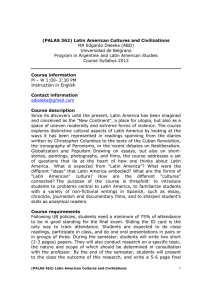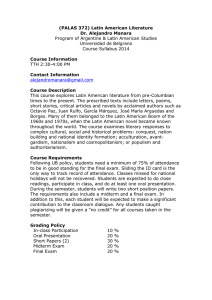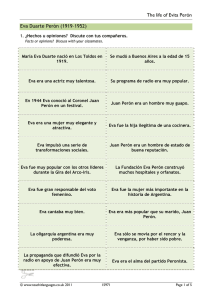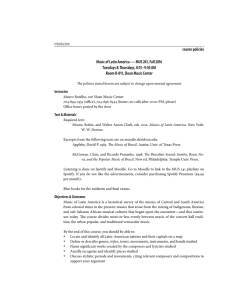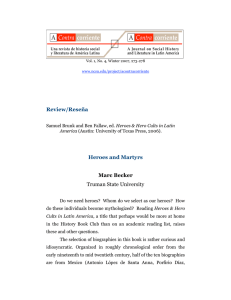(PALAS 362) Latin American Cultures and Civilizations Dr
Anuncio
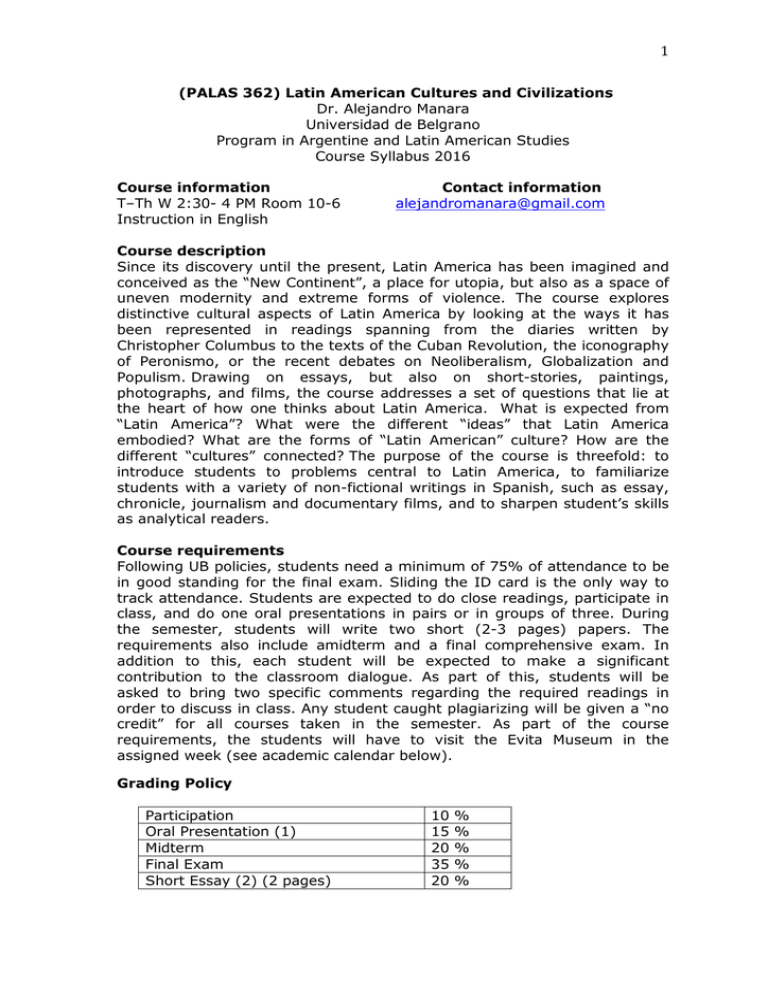
1 (PALAS 362) Latin American Cultures and Civilizations Dr. Alejandro Manara Universidad de Belgrano Program in Argentine and Latin American Studies Course Syllabus 2016 Course information T–Th W 2:30- 4 PM Room 10-6 Instruction in English Contact information [email protected] Course description Since its discovery until the present, Latin America has been imagined and conceived as the “New Continent”, a place for utopia, but also as a space of uneven modernity and extreme forms of violence. The course explores distinctive cultural aspects of Latin America by looking at the ways it has been represented in readings spanning from the diaries written by Christopher Columbus to the texts of the Cuban Revolution, the iconography of Peronismo, or the recent debates on Neoliberalism, Globalization and Populism. Drawing on essays, but also on short-stories, paintings, photographs, and films, the course addresses a set of questions that lie at the heart of how one thinks about Latin America. What is expected from “Latin America”? What were the different “ideas” that Latin America embodied? What are the forms of “Latin American” culture? How are the different “cultures” connected? The purpose of the course is threefold: to introduce students to problems central to Latin America, to familiarize students with a variety of non-fictional writings in Spanish, such as essay, chronicle, journalism and documentary films, and to sharpen student’s skills as analytical readers. Course requirements Following UB policies, students need a minimum of 75% of attendance to be in good standing for the final exam. Sliding the ID card is the only way to track attendance. Students are expected to do close readings, participate in class, and do one oral presentations in pairs or in groups of three. During the semester, students will write two short (2-3 pages) papers. The requirements also include amidterm and a final comprehensive exam. In addition to this, each student will be expected to make a significant contribution to the classroom dialogue. As part of this, students will be asked to bring two specific comments regarding the required readings in order to discuss in class. Any student caught plagiarizing will be given a “no credit” for all courses taken in the semester. As part of the course requirements, the students will have to visit the Evita Museum in the assigned week (see academic calendar below). Grading Policy Participation Oral Presentation (1) Midterm Final Exam Short Essay (2) (2 pages) 10 15 20 35 20 % % % % % 2 For a better understanding of the comparable table for grading: check the conversion table for the numerical scale (in orientation kit packet). Academic Calendar Week 1: The “New World”: Accounts of the Discovery and the Conquest: Tuesday, March 15: The ideas of Latin America. Travellers & Discoverers Christopher Columbus. “Letter to Luis de Santangel” Thursday, March 17: Amerigo Vespucci. Account of his first voyage. Edmundo O’Gorman. The invention of America (selection) Tzvetan Todorov. The Conquest of America (selection 14-33) Week 2. Tuesday, March22: Hernan Cortes. “The Second Letter” (excerpts). Bernal Díaz del Castillo. The conquest of New Spain. (selection). Week 3. Colonial Encounters and its Consequences Tuesday, March29: Great pre-Columbian civilizations (chapters from the Popol Vuh: The Sacred Book of the Ancient Quiche Maya and the Origin of the Aztecs)Film. Cracking the Maya Code. Documentary. Thursday, March 31 J.H. Elliott. “The Uncertain Impact”. “Cortés and Montezuma” John Hemming, “Atahualpa & Pizarro” Oral presentations will be assigned. Week 4. Revisiting the Conquest Tuesday, April 4: Bartolomé de las Casas. A short account of the destruction of the Indies. Oral presentation on Bartolomé de las Casas. Thursday, April 7: Werner Herzog. Aguirre, the wrath of God (screening in class). First short paper / Prompt by email. Week 5. Tuesday, April 12: Poma de Ayala Nueva Crónica del Buen Gobierno Thursday, April 14Simón Bolívar. “Letter of Jamaica”. José Martí “Our America”.Oral presentation on Simón Bolívar and José Martí.Short Paper is due Week 6. Tuesday, April 19:Domingo F. Sarmiento. Facundo. Civilization or Barbarism (Selection).Lucio V. Mansilla “A Visit to the Ranquel Indians” (146-153) Oral presentation. Thursday, April 20:Far away & long ago, (Chapter 7) W.H. Hudson and The Voyage of the Beagle, Charles Darwin (Chapter 6) &from Rough notes taken during some rapid journeys across the Pampas, “The Pampas Indians” & “The Town of Buenos Aires” by Francis Bond Head. OP on English Travelers. Week 7 Tuesday, April 26: Film. “Sor Juana” María Luisa Bemberg 3 Thursday, April 28: Alejo Carpentier: The kingdom of this world Week 8. Tuesday, May 3 Carlos Fuentes. “Land and Freedom: The Mexican Revolution” Juan Rulfo. “Tell Them Not to Kill me”, & “No Dogs Bark”.Oral presentations on Mexican Muralists / Rulfo/ Thursday, May5.Memories of Under-development, (T. Gutierrez Alea) Week 9. Tuesday, May 10z; Fidel Castro. “History will absolve me” (excerpts). Miguel Barnet. “Biography of a Runaway Slave” (58-64Salut les cubains (Agnès Varda. 1963) (27min film) Third Cinema: Julio García Espinosa, “For an Imperfect Cinema” (458-65)Thursday, May 12: Midterm Exam Week 10. The aesthetics of Peronism Tuesday, May 17: Daniel Santoro, Manual del niño peronistaJulio Cortázar, “House Taken Over”. Oral presentation on Cortázar. Thursday, May 19 J.M. Taylor: “The Myth of the Myth”. “Queen of Hearts” documentaryRodolfo Walsh, “That Woman”.Visit to the Evita Museum. Research and write a short paper on Evita. Oral presentation on Walsh Week 11. Dictatorships in the Southern Cone Tuesday, May 24: Fernando Solanas. The hour of the Furnaces (Argentina, 1968) /discussion. Thursday, May 26: Patricio Guzmán. Nostalgia of the Light (Chile, 2010) Repression in Chilean Dictatorship. Week 12. Tuesday, May 31: Andres Di Tella. Montoneros (Argentina, 1998) / screening in class.Short paper on Evita is due Thursday, June 2 Finnegan: Silver or Lead: The drug cartel La Familia gives local officials a choice: Take a bribe or a bullet.Ejército Zapatista. “Sixth Declaration of the Lacandon Jungle” Week 13. Tuesday, June 7: Invited Guestfrom the Brazilian Embassy in Buenos Aires. Lecture about F-H Cardoso, Lula da Silva and Dilma Rousseff’s presidencies. Thursday, June 9 Even the Rain, film by Iciar Bolain… about the Water War in Bolivia. Week 14 Tuesday, June 14. “The Maquiladoras”, William Langewiesche. Film: Lourdes Portillo, Señorita extraviada. Discussion. Oral Presentation on the Zapatistas & Maquiladoras. 4 Thursday, June 16. Review in class. Each student should bring a subject she/he feels strongly about. Week 15 Tuesday, June 21. Final exam. Thursday, June 23. “Final Grade Sheet and signature of Hoja de situación (attendance is mandatory)”. Bibliography Brennan, Timothy. “The Nation Longing For Form.” Nation and Narration. Homi K. Bhabha, ed. London: Routledge, 1990. 44-70. Chomsky Aviva et al. The Cuba Reader. Durham: Duke University Press, 2003) Cortázar, Julio. “The Gates of Heaven” (comic). Elliott, J.H. “The Uncertain Impact” The Old World and the New (1429-1650) Cambridge UP, 1970. 1-27 Galeano, Eduardo. Open Veins of Latin America: Five Centuries of the Pillage of a Continent. New York: monthly Review Press, 1977. Gené, Marcela.Un mundo feliz. Imágenes de los trabajadores en el primer peronismo. BA: Fondo/Universidad San Andrés, 2005. Gilbert, Joseph and Timothy Henderson, ed. The Mexico Reader. Durham: Duke University Press, 2002. Halperín Donghi, Tulio. Contemporary History of Latin America Berkeley: University of California Press, 1987. James, Daniel. “Perón and the People.” Resistance and Integration: Peronism and the Argentine Working Class, 1946-1976. Cambridge UP, 1988. 273-95. Kraniauskas, John. “Rodolfo Walsh y Eva Perón: “Esa mujer”. Nuevo Texto Crítico 12: (1993): 105-19. Levine, Robert M & John Crocitti, ed. The Brazil Reader. Durham:Duke University Press, 2003. 5 Martínez, Tomás Eloy. Santa Evita. Trad. Helen Lane. New York: Vintage, 1996. Marysa Navarro. “Evita, una de las primeras desaparecidas políticas de Argentina.” (JSTOR) - - -. “Wonderwoman was Argentine and her Real name was Evita.” Canadian Journal of Latin American & Caribbean Studies 24. London: 1999. 133. Navarro, Marysa, “Evita and the Crisis of 17 October 1945.” Journal of Latin American Studies, 12: 1 (Feb. 1980). Perlongher, Néstor. “Evita Live” My deep dark pain is love. Ed. Winston Leyland. San Francisco: Gay Sunshine Press, 1983. 53-57. Perón, Eva. In My Own Words (La razón de mi vida). Plotkin, Mariano. “May Day and 17 of October: Political Rituals and Peron´s charisma” and The Fundacion Eva Peron, in Mañana es San Perón: A Cultural History of Peron's Argentina. Delaware: Scholarly Resources, año. 39-82. Plotkin, Viviana. Cuerpo femenino, duelo y nación. Un estudio de Eva Perón como personaje literario. BA: Corregidor, 2003. Rochfort, Desmond. Mexican Muralists: Orozco, Rivera, Siqueiros. San Francisco: Chronicle Books, 1993. Rosano, Susana. Rostros y máscaras de Eva Perón. Imaginario populista y representación. Rosario: Beatriz Viterbo, 2006. - - -. “Apuntes para pensar la obra de Daniel Santoro.” Políticas del sentimiento. 241-54. Santoro Daniel. Manual del niño peronista. BA: La Marca, 2002. Sarlo, Beatriz. La pasión y la excepción. BA: Siglo XXI, 2003. Savigliano, Marta.“Evita: The Globalization of a National Myth” (Jstor) Soria, Claudia. Los cuerpos de Eva: anatomía del deseo femenino. Rosario: Beatriz Viterbo, 2005. Soria, Claudia, Paola Cortés Rocca, and Edgardo Dieleke ed. Políticas del sentimiento: el peronismo y la construcción de la Argentina moderna. BA: Prometeo, 2010. Starn, Orin et al. The Peru Reader . Durham: Duke University Press, 2005. Summer, Doris. Foundational Fictions: The National Romances of Latin America. Berlekeley and Los Angeles: U of California P, 1991. Taylor, J.M. “The Myth of the Myth” and “The Power of a Woman.” Eva Peron: The Myths of a Woman. Oxford: U of Chicago P, 1979. 1-19.
